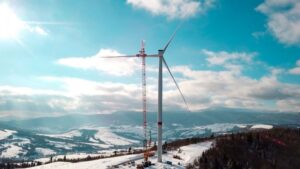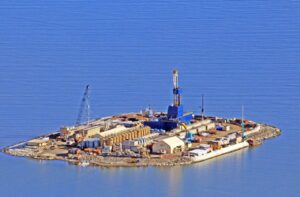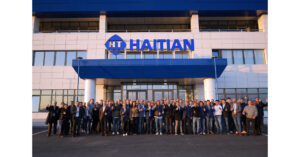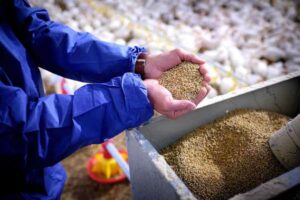
An Austrian municipal delegation visited Transcarpathia’s first wind farm, implemented by the management company Wind Parks of Ukraine, to learn about the Ukrainian model of decentralized generation and investor partnerships with local communities in wartime conditions.
According to the company’s press release, the delegation to Transcarpathia included the mayor of St. Anton am Arlberg (federal state of Tyrol, Austria) Helmut Mall, and the mayor, member of the Tyrolean Landtag, and chairman of the Committee on European Affairs, Federalism, and the European Region, Benedikt Lench.
Mall noted that this example demonstrates the correctness of Ukraine’s chosen model for the development of renewable energy. According to him, the interaction between a private company and the community yields measurable results for the quality of life in the region.
“In Zakarpattia, we see how renewable energy really works and contributes to the development of communities. It’s a win-win situation: the company produces electricity, and the communities receive funds for roads, schools, and social initiatives,” he said in the press release.
He also stressed that in the context of war, the strategic importance of renewable energy is only increasing, and the creation of decentralized generation sources is becoming not only a matter of development but also of security, given the daily shelling of Ukraine’s energy infrastructure.
Benedict Lench, in turn, praised the partnership format implemented by the management company Wind Parks of Ukraine in cooperation with the local community. He noted that 3% of the proceeds from the sale of electricity from the wind farm go to the local budget and are used for infrastructure and social projects, such as the repair of schools, roads, and other facilities.
“I consider it very positive that private companies are cooperating with communities. Together, we can achieve great results and create good projects,” he said, adding that this is how modern European energy development models work.
The company emphasizes that European representatives’ interest in Ukrainian wind projects is linked to how the energy sector is adapting to the realities of war and using decentralized generation to strengthen the stability of the energy system, especially in regions far from the front line but critical for balancing the system.
According to local authorities, the wind farm in the Nizhnovoritska community has provided over 40 MW of connected capacity since the beginning of 2025, which is one of the highest figures in Ukraine among communities, and the volume of generation exceeded 41 million kWh of “clean” electricity transmitted to the integrated power system.
The management company Wind Farms of Ukraine (TОВ “UK ”Вітропарки України“”) was established in 2011 to develop, build, and manage wind energy projects in Ukraine. According to the industry association UWEA, it is one of the largest energy holdings in the country’s wind energy sector. The company’s activities cover the entire cycle, from design and construction to the operation of wind farms.
According to public data from the state register, the company’s legal address is located in Perechyn, Zakarpattia Oblast, the date of registration is December 28, 2011, and the director is Vladislav Eremenko.
As noted by Forbes Ukraine, the founders of the wind energy business, which includes the management company Wind Parks of Ukraine, were entrepreneur Maxim Efimov and one of the co-owners of ISD, Oleg Mkrtchan, who created Ukraine’s only wind turbine manufacturing plant in Kramatorsk under license from the German company Fuhrländer. Vladislav Eremenko headed the management company.

State-owned Pakistan Petroleum Ltd. will build an island to create a launch pad for accelerating oil and gas exploration. The artificial island will be located approximately 30 kilometers off the coast of the southern province of Sindh, near the city of Sajawal, PPL’s chief executive officer for exploration and core business development, Arshad Palekar, told Bloomberg. According to him, this will prevent tidal waves from interrupting round-the-clock geological exploration work.
This project, the first of its kind for Pakistan, is based on the experience of Abu Dhabi, where artificial islands for drilling have been successfully built, Paleekar said.
Construction of the island will be completed in February, and operations will begin immediately after that, he added. The company plans to drill about 25 wells.
Drilling operations in Pakistan are gaining momentum after US President Donald Trump expressed interest in the country’s “huge oil reserves” in July. Since then, offshore exploration licenses have been issued to local companies PPL, Mari Energies Ltd. and Prime International Oil and Gas Co.

According to Serbian Economist, Chinese company Haitian International is launching pilot production at its new plant in Ruma (Vojvodina, Serbia), creating one of the largest production complexes in the region.
The project involves the construction of a factory with an area of up to 250,000 m² in the Rumska petlja industrial zone.
The initial phase includes approximately 59,000 m² for a production building, office building, and canteen. During the pilot phase, it is planned to produce up to 2,500 Mars and Jupiter series injection molding machines per year.
The total investment is estimated at around €100 million. In the first phase, the plant will employ about 300 people with salaries ranging from €650 to €1,000.
The city administration of Ruma and the Serbian government noted that the project will make a significant contribution to regional industrial dynamics and create new jobs. The plant will enable the Chinese investor to reduce logistics costs and serve the markets of Europe, the Middle East, and India more quickly.
The Serbian authorities consider the Haitian project to be strategic for the industrialization of Vojvodina and strengthening the inflow of foreign investment. The launch of pilot production in Ruma will strengthen Serbia’s industrial cluster and create the conditions for further technological investments.
Haitian International is a major Chinese manufacturer of injection molding machines, presses, and automated equipment. The plant in Ruma will be the company’s first significant production base in the Balkans.
https://t.me/relocationrs/1810

Khorol Mechanical Plant (Ukraine) has begun the process of localizing production in Turkey, according to the information and analytical agency APK-Inform, citing information from Valentin Surmach, director of the technical department at KMP.
“Taking into account the successful experience of joint implementation of complex projects, Izvik Makina Muhendislik Ic Ve Dis Ticaret Limited Sirketi has been selected as the main partner in the localization process,” he said at the AgroFood Summit-2025 international conference (Mersin, Turkey).
According to him, the localization stages include large-scale assembly, equipping products with electric motors and gear motors from Turkish manufacturers, and the phased organization of the production of components and parts in Turkey, including on the basis of outsourcing (by mutual agreement).
The plant confirms the warranty for equipment manufactured in the localization process, as well as the technical parameters of the technological lines based on the plant’s equipment, which Izvik Makina offers to its customers.
Khorol Mechanical Plant is a Ukrainian enterprise specializing in the manufacture of equipment for grain storage and cleaning; production of mixed fodder, cereals, flour, oil, seed material; aspiration systems; mechanical grain transportation; production of fuel pellets, briquettes, etc.

PJSC Central Mining and Processing Plant (CGZ, Dnipropetrovsk region), part of the Metinvest Group, increased its net loss by 3.5 times to UAH 1 billion 704.103 million in January-September this year, compared to UAH 520.593 million in the same period last year.
According to the company’s interim report, which is available to Interfax-Ukraine, the loss in the third quarter amounted to UAH 559.581 million.
In the first nine months of this year, the company increased its revenue by 10.9% to UAH 12.470708 billion.
Retained earnings at the end of September 2025 amounted to UAH 4.164960 billion.
In the first nine months of 2025, commercial production amounted to 2.062 million tons of concentrate (up 545,100 tons, or 35%, compared to 2024) and 1.692 million tons of pellets (up 28,600 tons, or 2%, compared to 2024). During the reporting period, 99.34% of products were supplied to the domestic market.
As part of the implementation of the plant’s capital investment program in Q1-Q3 2025, measures were taken to maintain production capacity, upgrade infrastructure, improve the efficiency of technological processes, and ensure the stable operation of the main production units. In accordance with the plant’s development program and within the established limits, railway tracks were re-laid and a railway track was built at the Grekukata station. Unloading station – Grekukata station; construction and installation work continued in the chamber of the section substation and tunnels as part of the project to provide power to the 607 m horizon of the Kolachevsky mine, and the construction of ort-entrances and the installation of vibrating rock loading units is also continuing.
In addition, work is underway to expand the tailings dam to a height of 129 m; measures are continuing to remove topsoil from the Artemivsk quarry; work is being carried out to modernize the cable communication infrastructure of the plant and the local computer network (Gleyuvatka fiber-optic communication line); major repairs of the washing facilities of the crushing plant, the Kolachevsky mine, and the Petrivsky quarry are continuing; During the plant’s daily shutdown, d1200 mm gates were replaced.
The plant ended 2024 with a net loss of UAH 648.004 million, compared to UAH 1 billion 326.661 million in 2023. In 2022, the company reduced its net profit more than fourfold, to UAH 2 billion 117.831 million from UAH 8 billion 919.978 million in 2021. In 2020, TsGZK increased its net profit by 8.7% compared to the previous year, to UAH 1.601 billion.
CGZK is one of the five largest producers of mining raw materials in Ukraine, specializing in the extraction and production of iron ore raw materials (concentrate and pellets). The average number of full-time employees is 3,360.
Metinvest B.V. owns 100% of the shares in ChGOK.
The authorized capital of PrJSC ChGOK is UAH 296.635 million, with a share par value of UAH 0.25.
CGZ is part of the Metinvest Group, whose main shareholders are PJSC System Capital Management (SCM, Donetsk) (71.24%) and the Smart Holding group of companies (23.76%). The managing company of the Metinvest Group is Metinvest Holding LLC.

UBS analysts expect copper prices to rise next year due to reduced supply amid ongoing mine disruptions.
In addition, the rise will be supported by high long-term demand associated with the transition to clean energy and increased investment in this area, the bank said in a statement.
UBS raised its copper price forecast for the end of the first quarter of 2026 by $750 to $11,500 per ton. Expectations for June and September were raised by $1,000 to $12,000 and $12,500 per ton, respectively. Experts also set a target level for December next year at $13,000 per ton.
Analysts now believe that the copper deficit in the global market this year will be about 230,000 tons, compared to the previously expected 53,000 tons, and in 2026 – 407,000 tons, compared to 87,000 tons. In their opinion, declining inventories and ongoing supply risks will keep the market tight.
Disruptions at mines this year, including production problems at Freeport-McMoRan’s Grasberg mine in Indonesia, slower recovery of production in Chile, and recurring protests in Peru, highlight structural supply constraints that are likely to persist until 2026, the bank said in a statement.
Freeport-McMoRan said it plans to resume production at the Grasberg copper and gold mine by July after operations were suspended two months ago due to a fatal accident.
UBS lowered its forecast for refined copper production growth to 1.2% in 2025 and 2.2% next year, citing deteriorating ore quality and operational problems. Analysts expect global demand for the metal to increase by 2.8% both this year and next due to the development of renewable energy sources, electric vehicles, investments in power grids, and data centers.
The bank’s experts believe that any price decline will be short-lived and recommend maintaining long positions in copper.
Earlier, the Experts Club information and analytical center released a video dedicated to global copper production and leading producing countries – https://youtube.com/shorts/_h8iU50z8C0?si=a-XkgGEfeUxseQNa